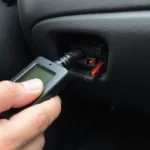The OBD2 signal ground, also known as the sensor ground, is a crucial element in the On-Board Diagnostics II system. It provides the common return path for the various sensors throughout your vehicle to send data back to the ECU. Understanding how this ground works is essential for accurate diagnostics and troubleshooting. Let’s delve deeper into this often overlooked but vital component.
A properly functioning OBD2 signal ground ensures accurate voltage readings from sensors, allowing the ECU to interpret data correctly and manage engine performance, emissions, and other crucial functions. A faulty signal ground can lead to a range of issues, from inaccurate diagnostic readings to drivability problems.
Checking for an OBD2 pakr assist feature can sometimes involve understanding the signal ground, especially when diagnosing electrical issues. Likewise, understanding the pinouts, such as in a 2011 Chevy truck OBD2 pin schematic, requires a grasp of the grounding system.
One common problem arising from a faulty signal ground is inaccurate sensor readings. Because the sensors rely on this ground to complete the circuit, any disruption can result in voltage fluctuations that the ECU interprets as faulty sensor data. This can trigger false trouble codes, leading to unnecessary repairs and frustration. Another issue is intermittent problems. A loose or corroded signal ground can cause intermittent communication issues between the sensors and the ECU, leading to sporadic malfunctions that are difficult to diagnose.
The Importance of a Stable OBD2 Signal Ground
Why is a stable OBD2 signal ground so important? A stable ground provides a consistent reference point for the sensors, allowing them to send accurate signals to the ECU. This accuracy is vital for the ECU to make the correct adjustments for fuel delivery, ignition timing, and other critical engine parameters. Without a stable ground, the entire diagnostic system can be compromised.
Imagine trying to measure the depth of a well with a rope that keeps stretching and shrinking. You’ll get inaccurate readings. Similarly, a fluctuating OBD2 signal ground distorts the sensor signals, leading to misdiagnoses and potentially costly repairs.
Troubleshooting OBD2 Signal Ground Issues
How can you identify and fix OBD2 signal ground problems? First, consult your vehicle’s wiring diagram to locate the signal ground wire for the specific sensor you’re testing. You can often find this information in your vehicle’s repair manual or online resources. Then, using a multimeter, check the resistance between the sensor ground and a known good ground point on the vehicle chassis. The resistance should be very low, ideally close to zero.
Knowing how to connect an OBD2 distributor to an OBD1 harness can also be relevant in certain situations, particularly when dealing with older vehicles. This process often involves grounding considerations to ensure proper operation.
“A common mistake is assuming the problem is with the sensor itself,” says automotive diagnostics expert, John Miller. “Always check the ground first. It’s often the simplest solution to a seemingly complex problem.”
Common Causes of OBD2 Signal Ground Problems
Several issues can cause problems with the OBD2 signal ground. Corrosion is a common culprit, especially in older vehicles or those exposed to harsh weather conditions. Loose connections, often due to vibration or improper installation, can also interrupt the ground circuit. Damaged wiring, caused by rodents, accidents, or general wear and tear, can also lead to signal ground problems.
 OBD2 Signal Ground Corrosion and Damage
OBD2 Signal Ground Corrosion and Damage
Sometimes, information regarding the OBD2 connector can be found in different languages, such as Japanese (OBD2 コネクタ). Understanding these diverse resources can be helpful for troubleshooting.
“Don’t underestimate the importance of preventative maintenance,” advises Miller. “Regularly inspecting and cleaning your vehicle’s electrical connections, including the signal ground, can prevent many problems down the road.”
Conclusion
The OBD2 signal ground plays a vital role in the proper functioning of your vehicle’s diagnostic system. Understanding its importance and how to troubleshoot potential issues can save you time, money, and frustration. By ensuring a stable and reliable signal ground, you can ensure accurate diagnostic readings and keep your vehicle running smoothly.
FAQ
- What is the OBD2 signal ground?
The OBD2 signal ground is the return path for sensor signals to the ECU, ensuring accurate voltage readings.
- What are the symptoms of a bad OBD2 signal ground?
Symptoms include inaccurate sensor readings, false trouble codes, and intermittent drivability problems.
- How do you test an OBD2 signal ground?
Use a multimeter to check the resistance between the sensor ground and a known good ground point. The resistance should be near zero.
- What are the common causes of OBD2 signal ground problems?
Corrosion, loose connections, and damaged wiring are common causes.
- How can I prevent OBD2 signal ground problems?
Regular inspection and cleaning of electrical connections can prevent many issues.
- Why is a stable signal ground important?
A stable signal ground ensures accurate data transmission from sensors to the ECU.
- What should I do if I suspect an OBD2 signal ground problem?
Consult your vehicle’s wiring diagram and test the ground with a multimeter. If necessary, consult a qualified mechanic.
For assistance with your OBD2 needs, please contact us via WhatsApp: +1(641)206-8880, Email: [email protected] or visit us at 789 Elm Street, San Francisco, CA 94102, USA. Our customer support team is available 24/7.

